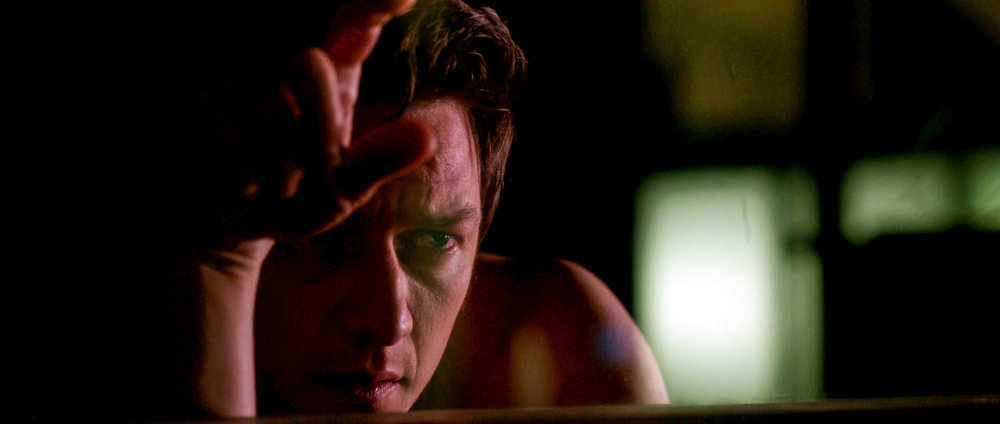
Snap! Fizzle! Plop!
As the end credits rolled on Trance, my friend Matt shoved his thumb in my face with a probing, "Enh?" Like a haywire Geiger counter, it wavered between "Thumbs Up" and "Thumbs Down". My Siskel/Ebert Scale was well-calibrated, or so I thought, and my thumb shot firmly up. I admitted that the movie had completely lost me in its middle third, but director Danny Boyle brought me back from the brink with his off-the-wall climax. It turns out, I may have still been under Boyle's spell as the lights went up: by the time I got home, I'd realized his latest film isn't very good.
Boyle is a hard director to pin down. After his quirky, gritty drug trip Trainspotting shot him into the stratosphere, he dabbled in comedy, drama, horror, and sci-fi before stepping into the rarified air of Oscar-winning Filmmakers. He took the statue for Slumdog Millionaire and was nominated for 127 Hours. I hated both movies, seeing them as stylistically authentic to Boyle's voice, but devoid of the grit, smarts, and soul on which he'd built his career.
I went into Trance knowing very little about the plot and not having seen so much as a trailer. But from the opening minutes, I knew this was a return to form. As Simon (James McAvoy) walks us through an Ocean's Eleven-style art-auction heist, complete with a visual history of such schemes, I immediately recognized him as an alternate-universe, adult version of Trainspotting's Mark Renton character. Working-class and untrustworthy as hell, but looking and sounding like an utter sophisticate, he narrates the very public, very violent theft of Goya's Witches in the Air.
Simon works for the auction house, but has also taken a job as the inside man on Franck's (Vincent Cassel) team of armed, suit-wearing thugs. He has gambling debts to pay, you see, and has fallen into such a deep, paranoid hole that he feels compelled to rip off even his criminal-mastermind boss. During an awkward showdown, Franck cracks Simon on the head with a shotgun, not realizing Simon had stashed the painting and delivered him an empty security case.
Simon wakes up with partial amnesia. He remembers his official and unofficial jobs, as well as both employers, but can't recall where he hid the £27 million painting. Determined to shake the mystery free, Franck enlists the services of a hypnotherapist named Elizabeth (Rosario Dawson).
My synopsis ends here. If you plan to see Trance, it's best to do so with as unspoiled a mind as possible. As I said, the last twenty minutes are pretty terrific, and make a great bookend to Boyle and co-writers Joe Ahearne and John Hodge's intriguing setup. But not long after Elizabeth enters the story, the movie takes a dramatic left turn into love triangle territory, entangling Franck, Simon, and Elizabeth in a head-scratching, uninteresting mess that only makes sense in the context of the climactic, Usual Suspects-style monologue that peels the narrative onion down to a nub.
I wanted so badly to leave during the film's middle. Personal policy, combined with a train-wreck fascination regarding the story's direction, kept me strapped in (strapped in but fidgety, I should say). I was also entertained by Trance's atmosphere, which is classic Boyle, through and through. From Anthony Dod Mantle's crazy, in-camera visual musings to Rick Smith's hypnotic and chameleonic score, the feel is never dull--even when the characters and their motivations are exceedingly so. Not even the sight of an utterly nude, utterly shaved Rosario Dawson could loop me back into Caring Mode, because it seemed like a cheap ploy to keep audience members from rushing the exits.
The frustrating thing is, there's a legitimate story reason for the hairless pie. It's buried in the movie's exposition-heavy climax, a mostly great scene that answers every nagging question and makes sort-of-okay all the weird love-triangle bullshit--while also crumbling into a gag-me-cute finale that should have never been written, much less filmed. Simon and Elizabeth's stories are much darker and deeper than anyone could have imagined at the outset, and were it not for the uneven quality of the rest of the picture, I'd hail Trance as one of the year's best.
But a handful of good scenes, a legitimately great one, and a gallery's worth of sub-par ones does not make a movie worthwhile. I'm sad to report that not even the engaged, powerhouse cast can overcome the clumsy material enough to recommend this as a performance piece. I'll probably watch Trance again in a few years, just to see if I can finally appreciate that sagging middle. Until then, I can only dismiss Boyle's latest effort as a hybrid of his sassy, London-underground roots and the grotesque, statue-grabbing gloss that has plagued his recent work.
Note: This will be the weekend of dueling Trippy Identity-Theft Films: Trance and Upstream Color. For a less visually dazzling but far more intellectually, spiritually, and emotionally satisfying time at the movies, seek out Shane Carruth's new feature, and be truly entranced.

